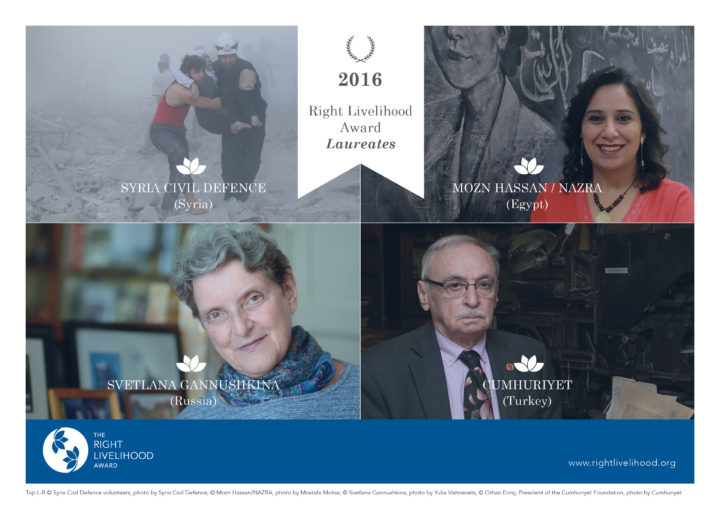The Laureates of this year’s Right Livelihood Award, widely referred to as the ‘Alternative Nobel Prize’, have been announced today in Stockholm, Sweden.
This years’ Laureates are:
Syria Civil Defence (The White Helmets), ‘for their outstanding bravery, compassion and humanitarian engagement in rescuing civilians from the destruction of the Syrian civil war’. It is the first time that a Right Livelihood Award goes to a Laureate from Syria.
Egypt’s Mozn Hassan and Nazra for Feminist Studies, ‘for asserting the equality and rights of women in circumstances where they are subject to ongoing violence, abuse and discrimination’.
Russia’s Svetlana Gannushkina, ‘for her decades-long commitment to promoting human rights and justice for refugees and forced migrants, and tolerance among different ethnic groups’.
Cumhuriyet, a leading independent newspaper in Turkey, ‘for their fearless investigative journalism and commitment to freedom of expression in the face of oppression, censorship, imprisonment and death threats’.
The announcement was made at the Swedish Foreign Office International Media Centre by Ole von Uexkull, Executive Director, and Marianne Andersson, Board Member of the Right Livelihood Award Foundation, following the decision by an international Jury that considered 125 nominations from 50 countries.
Ole von Uexkull commented: “This year’s Right Livelihood Award Laureates confront some of the most pressing global issues head-on — be it war, freedom of speech, women’s rights or the plight of migrants. With the 2016 award, we do not only celebrate their courage, compassion and commitment; we also celebrate the success of their work, against all odds, and the real difference they are making in the world today”.
Established in 1980, the Right Livelihood Award honours and supports courageous people and organisations offering visionary and exemplary solutions to the root causes of global problems.
As of today, there are 166 Laureates from 68 countries. This year’s laureates receive a cash award of SEK 3 million (EUR 315,000), equally shared among the four.










